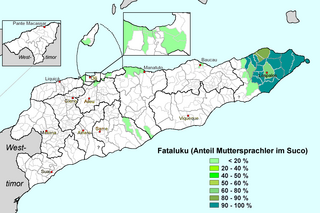| Fataluku | |
|---|---|
| Region | Eastern East Timor |
Native speakers | 48,000 (2020)[1] regional usage |
Trans–New Guinea ?
| |
| Official status | |
Recognised minority language in | |
| Language codes | |
| ISO 639-3 | ddg |
| Glottolog | fata1247 |
 Distribution of Fataluku in East Timor | |
Fataluku (also known as Dagaga, Dagoda', Dagada) is a Papuan language spoken by approximately 37,000 people of Fataluku ethnicity in the eastern areas of East Timor, especially around Lospalos. It is a member of the Timor-Alor-Pantar language family, which includes languages spoken both in East Timor and nearby regions of Indonesia.[2] Fataluku's closest relative is Oirata,[3] spoken on Kisar island, in the Moluccas of Indonesia.[4] Fataluku is given the status of a national language under the constitution. Speakers of Fataluku normally have a command of Tetum and/or Indonesian,[5] those speakers who are educated under Portuguese rule or from younger generation educated under Portuguese-language educational system during independence speak Portuguese.
It has a considerable amount of Austronesian loanwords, and it has borrowed elements of Sanskrit and Arabic vocabulary via Malay and elements of Portuguese.[3]
The five main Fataluku dialects are identified as follows: East Fataluku, South Fataluku, Central Fataluku, North Fataluku and Northwest Fataluku. [6] The differences that exist between these dialects, especially beyond phonology, are unclear and require more research. Dialects differ with respect to the phonetic realization of palatal obstruents, the presence of a glottal stop phoneme and a voicing distinction in stops, as well as aspects of the stress system. [7]